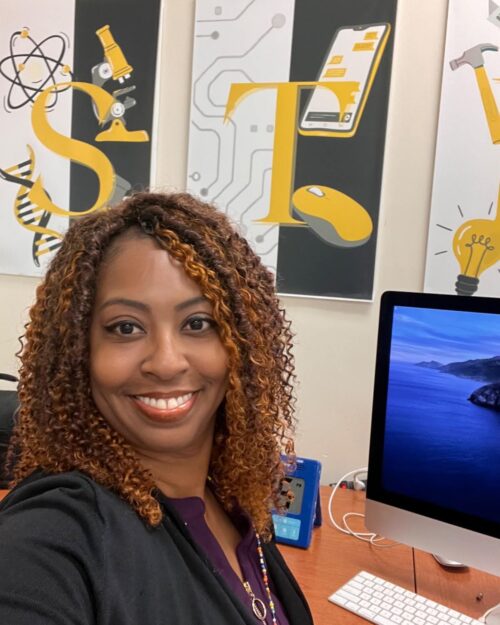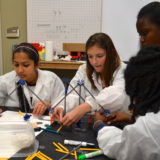October 22, 2024

Carlise Bethel, a dedicated educator with 13 years of experience, has always had a love for science. Growing up, she dreamed of becoming a veterinarian, inspired by the fantastic science teachers she had along the way. Her passion for science continued to grow through her middle school years and into Oxon Hill High School in Maryland, where she now teaches, returning to her alma mater to inspire the next generation.
In high school, Carlise was exposed to a wide range of science courses, which helped her develop a deep appreciation for different fields. She initially pursued a biology track, and her hard work paid off when she was selected as part of the sixth class of Meyerhoff Scholars at the University of Maryland, Baltimore County (UMBC). During her senior year, while enrolled in an developmental biology class, Carlise discovered her passion for research.
The field of scientific research opened her eyes to a career path where she could work on projects for years, becoming a niche expert in her field. This realization led her to enroll in the Meyerhoff Graduate Fellowship program and later continue her postdoctoral journey at Johns Hopkins University. It was at this time that Carlise had another revelation – her love for teaching. Her experiences working with faculty members at Johns Hopkins University sparked a desire to switch gears and make a lasting impact through education.
Carlise began her teaching career in Prince George’s County Public Schools. She taught subjects like biology, environmental sciences, organic chemistry, and Advanced Placement science courses. Through these years, she realized that the perseverance required for success in STEM is best achieved with the help of mentors and teachers; this motivated her to make her own impact in education.
Her connection with the AEOP and the GEMS program began when she participated in a DoD STEM Ambassador exchange program, where she met Dr. Debbie Black-Conn. Hearing about the need for educators in the GEMS program, she applied to be a Teacher. She joined the program for the first time last summer. Over six weeks, she worked with students from 5th to 12th grades, leading them through weeklong STEM exploration programs.
One of her favorite parts of the GEMS program is the intentional design to expose students to as many fields as possible. In each program, students experience new activities without repetition, from 3D printing to biotechnology. A highlight for Carlise is watching students grow more comfortable sharing their vision boards at the end of each week, showcasing what they’ve learned. She found it especially rewarding to see students return in 2024, a testament to the program’s value.
She also highlighted the benefits of project-based learning implemented across GEMS programs. Students work on designing inventions, and, in the process, they also learn about the importance of marketing and protecting intellectual property, like patents and trademarks.
One memorable moment from her time with GEMS involved a Lego train-building exercise where students relied on communication and teamwork to complete the challenge. The groups that finished early even helped the others, embodying the collaborative spirit that drives scientific progress. It’s experiences like this that Carlise values most, as they mirror the real-world problem-solving students will face in their future careers.
For educators, Carlise views GEMS as one of the best professional development opportunities available. It offers them a chance to step into the role of a student, explore new technologies, and bring fresh ideas back to their classrooms. She recalls working with Arduino microprocessors, building circuits, and learning coding alongside the students. This hands-on experience not only allows educators to step outside their comfort zones but also to reconnect with the excitement of learning new concepts.
Looking back, she recognizes that GEMS has helped her both professionally and personally, providing her with new skills and a renewed passion for teaching. Her advice to fellow educators is simple: take the leap. Even if you’re not familiar with newer STEM concepts, you’ll find joy in learning alongside your students, and you might just spark an interest in STEM that will last a lifetime.
To students, Carlise encourages participation in programs like GEMS as a way to explore various STEM fields. Even if you discover something you don’t enjoy, that knowledge is just as valuable as finding your passion. With the right mentors and teachers, a single week in GEMS could be the starting point for a lifelong journey in STEM. As Carlise says, “You never know where that start will take you—one week is all it takes!”

Gains in the Education of Mathematics and Science (GEMS)
Gains in the Education of Mathematics and Science (GEMS) is an U.S. Army-sponsored, summer STEM enrichment program for middle and high school students that takes place in participating U.S. Army research laboratories and engineering centers.
More About Gains in the Education of Mathematics and Science (GEMS)Find a Volunteering Opportunity
Visit our Program Volunteers page for a tool to find the best opportunity for you.
eCYBERMISSION Mini-Grant
The eCYBERMISSION Mini-Grant is intended to support teachers/program leaders as they implement eCYBERMISSION with their teams. Educators (formal and informal) of students in grades 6-9 are encouraged to apply.
